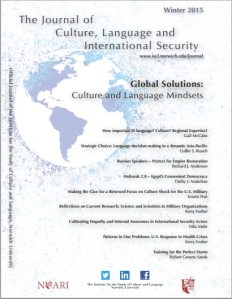The latest issue of The Journal of Culture, Language and International Security includes an article by me on Cultivating Empathy and Internal Awareness for International Security Actors. As Robert Jervis said, “The ability to see the world and oneself as others do is never easy and failures of empathy explain a number of foreign policy disasters.”
Check out the issue here (PDF) and learn more about the Journal and Institute for the Study of Culture and Language here.
